- Home
- Lois Lowry
Your Move, J. P.! Page 5
Your Move, J. P.! Read online
Page 5
"James?" Angela's soft voice was shy. She had come up behind him quietly in the deserted hall. J.P. jumped, startled.
"I'm sorry to bother you, especially when you're thinking about your cousin," she said politely. "But I looked for you in the cafeteria and you weren't there."
"I wasn't hungry."
Angela caught her breath. "I'm so sorry," she whispered sympathetically. J.P. cringed, realizing that she was, in her mind, listing "lack of appetite," or even "anorexia," as a symptom of his terrible disease.
"I thought we might get together to plan our costumes for the Spring Fling," Angela suggested. "Lindsay and Antonio are going to be robins. They're making wings and tails out of cardboard, and they're going to have red breasts."
J.P. could feel his face begin to turn crimson. Hearing anyone say the word "breasts" aloud always made his face redden, but to hear Angela say it, even if she was talking about robins —well, J.P.'s face became warmer and pinker than usual.
But she hadn't noticed. She hadn't even noticed, J.P. realized, that she had said that word—breasts—aloud. She just continued talking very cheerfully.
"And Mr. Goldfine says that because of his name he's going to be a goldfinch. He has some bright yellow trousers, he says, that he bought once for a trip to the Caribbean, and he's going to get a yellow shirt to go with them, and then he'll paint some black trim on the shirt, and wear a black mask, because a goldfinch has a black mask across its face. Does everyone have to do birds, James? Because the good birds all seem to be taken."
J.P. shook his head. "It just has to be connected to spring somehow," he said. "That's the only rule. Lots of people do flowers and stuff."
Angela looked at her watch. "We still have ten minutes before class starts," she said. "Let's sit down in here and think." She opened the door to the empty science lab—the Myerson Lab—and J.P. followed her inside.
"Spring," she mused, after she had settled herself on one of the lab stools.
"Spring," J.P. replied. Once again he was aware of his tendency to repeat everything that Angela said. There was a name for that, he recalled: echolalia. He had read about it once. J.P. gulped, thinking of it. Echolalia was a symptom of schizophrenia.
" 'In spring a young man's fancy lightly turns to thoughts of love,' " Angela said suddenly, with a bashful smile. "That's Tennyson," she explained.
Hearing Angela say the word "love" was almost as embarrassing as hearing her say "breasts." Not quite, but almost. J.P. tried frantically to change the subject. "You'd think a guy named Tennyson would write about tennis," he said. "People's thoughts turn to tennis in the spring."
"Perhaps we could dress as tennis rackets," Angela suggested. "But I can't for the life of me imagine how to do it."
"Tennis rackets," J.P. said, thinking. Echolalia again.
"Hey, Angela!" he said suddenly. "How about golf! People's thoughts turn to golf in the spring!"
"Golf?" Angela said. "If we can't dress as tennis rackets, how on earth could we dress as golf clubs?"
"Not clubs, Angela. Bags! Golf bags! What do you think? It'd be original! In all the years I've been going to Spring Fling, no one's ever dressed as a golf bag!"
"Golf bags?" Angela's eyes were wide and skeptical.
"Look," J.P. said. His voice was excited now. He was excited. He was certain that nobody had ever worn a golf bag costume to Spring Fling. "You and I: we're both pretty ski—" He hesitated. He had been about to say "skinny," but he realized that might seem insulting to Angela. "We're both slender," he said. Angela nodded, agreeing with him.
"I bet anything we could each fit into a golf bag," he told her. "All we have to do is cut eyeholes and armholes."
"But where would we get golf bags?" Angela asked. "They're terribly expensive. I know my father would never—"
"Easy!" J.P. said, elated that he had thought of such a unique idea. "Near where I live, on the West Side, there's a crummy old thrift shop. It's where winos and bag people buy their winter coats? I get electronic stuff there, broken clocks and radios to fool around with. Once my mom got an old clothes basket there, for a quarter, and she painted it green to match the rug, and she keeps magazines in it, in the bathroom, so now if you're—"
He stopped, suddenly, hideously embarrassed once again, this time because he had begun talking about bathrooms in front of Angela.
But Angela was listening with interest. "Do they have golf bags there?" she asked.
J.P. nodded. "Always. In the back there are always old golf bags. They never sell them, because the people in the store aren't the kind of people who play golf. So there's always a pile of old golf bags. There are leather ones, or plaid—"
"I want to be plaid," Angela said, her eyes dancing with anticipation. "Are they expensive, do you think?"
J.P. shook his head. "They'll probably pay us to take a couple of them away," he told her. "You want to come home with me after school today, and check it out?"
She nodded, and J.P.'s heart soared with astonishment, passion, and success.
Walking through Central Park after school, the beautiful Angela Patricia Galsworthy by his side, J.P. nodded a greeting to his oddly dressed friend Ralph, who was on his usual bench.
Ralph raised an eyebrow at J.P. "G for gingivitis," he announced as J.P. neared the bench. "Gum disease. I lost all my teeth to gingivitis years ago. These here are fake." He grinned an exaggerated grin, to show J.P. his dentures.
J.P. grinned back. He took a deep breath and reached for Angela's hand. Never before in his entire life had he intentionally taken a girl's hand, not since the time he grabbed his little sister by the wrist when she was three and had almost run out into the traffic-filled street on Central Park West.
But today he took Angela's hand, and she did not draw hers back.
"Goose bumps," he said happily to Ralph, and continued on through the park with Angela's hand in his.
The little shop on upper Broadway, not far from the Tate apartment, was called Attic Treasures, but the word "treasures," J.P. thought, was an exaggeration; and "attic" may have been, too. What it was, was "basement junk." Stuff that the trash guy hadn't picked up yet.
He and Angela stopped on the sidewalk and peered through the grimy windows.
"Look!" J.P. said, pointing, "a whole set of old dentist's tools. I may buy that sometime. It's probably expensive, though."
Angela glanced, with a look of distaste, around the dusty collection of things that were visible through the window. "It's terribly musty," she said.
"Think what you could do with dentist's tools," J.P. said blissfully.
Angela shuddered. Finally she said, "I see a pretty dish over there. But it has a crack down the middle."
"Yeah," J.P. said happily. "A lot of the stuff's broken. That's when you can really get a bargain, when it's broken. I got a toaster once for forty cents. Heck, the parts were worth more than that."
Angela looked skeptical. But she followed gamely when J.P. pushed open the door and went inside.
"Mr. Mudgett?" J.P. called. "Anybody home?"
From the back of the dimly lit, cluttered room came a fluttering sound as some papers had fallen from the top of a high stack. Behind them, the figure of a tall, bald man arose. He squinted toward J.P. and Angela, adjusting his metal-rimmed glasses across the bridge of a long, rather crooked nose. He smiled.
"James," he said. "Welcome. I'm afraid I was dozing. I set out to look through these old piles of sheet music. Look here, I have 'In a Little Spanish Town' in my hand, still. That's 1926, imagine that. You weren't even born, James. Your mother wasn't born. And I myself was just a boy. Coolidge was president. Did you know that, James: Who was president in 1926?"
J.P. shook his head. "I would've guessed Teddy Roosevelt, if it was a quiz show," he admitted.
Mr. Mudgett hummed a few bars of "In a Little Spanish Town"; he set the piece of music back on a precariously tall stack, and dusted it with the side of his hand.
"Coolidge was president
, Jimmy Walker was mayor of New York, Pius XI was Pope, and Bubbling Over won the Kentucky Derby," he murmured. "Not a bad year, 1926." Then he turned toward J.P. and Angela again. "Who's your friend, James?" he asked politely, readjusting his glasses.
J.P. introduced Angela to Mr. Mudgett. The old man tilted his head with interest as he listened to her accent.
"British," he said. "I don't know a single thing that happened in Great Britain in 1926, I'm afraid. Do you?"
Angela shook her head. "I'm sorry," she told him.
"What can I do for you today, James?" Mr. Mudgett asked.
J.P. pointed toward the door that obviously led to a back room. "I remembered that you had a whole bunch of old golf bags out there. And Angela and I—"
"Bobby Jones won the U.S. Open in 1926," Mr. Mudgett announced happily. "But Walter Hagen took the PGA tournament that year.
"Not a bad year, 1926, except for the economy," he said to himself. Then he turned again to J.P. "Go take a look, you and your friend. Special this week on golf bags. Any two for a dollar."
Angela followed J.P. to the back room. Behind them, they could hear Mr. Mudgett singing to himself and could hear the shuffling of his feet on the wooden floor. He was dancing, too.
"in," Mr. Mudgett sang with emphasis, "da da da—a little Spanish town —da da da—"
9
"Well. J.P.," his mother said at dinner that night, "I really have to hand it to you. You're one of a kind. A true original."
"Really, J.P.," his sister, Caroline, said, with admiration in her voice.
J.P. beamed and reached for another helping of chicken. It was his finest hour.
For one thing, Angela Patricia Galsworthy was actually there, actually sitting across the table, in the Tates' kitchen, eating dinner with them as if it were not the most surprising event in the world. Mrs. Tate had said sure, when J.P. asked; and Angela's father had said sure, when Angela called (although J.P. was quite certain that a distinguished British doctor wouldn't say "sure"; he probably had said, "By all means"—or maybe "Righto").
And in addition, J.P. and Angela were going to have the most original, most startling costumes that had ever represented spring at the Burke-Thaxter School.
The two golf bags were propped up against the wall in the living room. J.P.'s was dark green, and Angela's was red plaid. They were ready, at last, for the Spring Fling, though it had not been an easy afternoon.
First, while Caroline watched with fascination, J.P. had laid both golf bags on the living room rug.
"Which one do you want, Angela?" he had asked politely.
"The red plaid, I think," Angela said. "If that's all right with you, of course, James," she added. Caroline had put her hand to her mouth and giggled. No one had ever ever said "if that's all right with you, of course, James" to her brother before.
"That's just fine," J.P. said. "Okay, climb in and let's see how it fits."
"Which way?" Angela asked, looking at the golf bag with a frown. "Head or feet first?"
"Head," J.P. directed. "Then I'll be able to tell where to put the eyeholes."
Angela knelt at the open end of the bag and peered in apprehensively. Then she took a deep breath, lay flat on the rug, and began to wiggle into the bag headfirst.
"You look like a snake going into a hole!" Caroline called.
"It's terribly dark in here!" Angela's voice was muffled. Her shoulders had disappeared; soon her arms, too, were gone. She had had to hold them tightly to her sides in order to fit into the bag. The hem of her skirt disappeared. Then her knees, too, were gone. Finally nothing showed of Angela except her knee socks and shoes.
"Is that as far as you can go?" called J.P.
"Yes!" Angela's muffled voice replied.
"Okay, stand up!" J.P. called.
There was a silence. Then Angela called back, "Stand up?"
"Yeah, so I can find the place for eyeholes!"
Silence. Angela's feet wiggled, as if she were trying to swim.
Caroline whispered to her brother. "J.P., she can't stand up! She can't bend!"
"Why are you whispering?" J.P. whispered back.
"I don't know. Is she all right? Why isn't she saying anything?"
Angela's feet wiggled again.
"Angela, I'm going to stand you up, okay?" J.P. called into the bag.
"Okay, I guess." The voice sounded a long distance away, and not very happy.
"Help me, Caroline," J.P. directed. Together they lifted the golf bag, with Angela inside, into a standing position.
Tentatively Angela moved her feet. She walked a couple of short steps across the living room.
"Remember that old TV commercial, J.P.? The one with the dancing cigars?" Caroline whispered.
J.P. was watching the golf bag with interest. "Yeah," he said. "It looks a lot like that, doesn't it?
"Angela!" he called. "Try a dance step!"
But Angela's feet had stopped moving. She planted them both resolutely on the Tates' living room rug.
"Help!" she called.
"Help with what?" J.P. called back into the plaid canvas of the bag.
"Get me out!" Angela wailed. "I can't breathe!"
J.P. sighed. "I knew there was going to be a flaw," he said unhappily.
Together he and Caroline lifted the golf bag off of Angela, exposing her knees, then her skirt, then her arms, and finally her shoulders and head. Her blond hair was coated with feathers of dust and her forehead glowed with perspiration.
Angela took a deep breath, and then another. "I have claustrophobia," she said. "I never knew it before. "
Claustrophobia, J.P. thought. That was an excellent C. Much better than common cold. Aloud, he said, "It's not going to work that way, even with eyeholes. Lemme try it feet first."
He lay on the floor at the end of the green bag, and began to slither in, as Angela and Caroline watched.
J.P. eyed the two bags as he finished the ice cream his mother had served for dessert. He and Angela and Caroline had worked all afternoon on them, and they were just about perfect now. They had carefully removed each bottom, so that they could now stand inside the bags with their heads emerging from one end and their feet from the other. They had cut armholes. It was tough to slither into the bag and poke your arms into the holes, but after you got the hang of it, it could be done. And once you were inside, the bag didn't slip. At first that had been a problem. But J.P. had invented and installed shoulder straps, and now the golf bags stayed in place.
They could walk, wearing the bags, if they took short steps. They couldn't sit or bend, of course. But that didn't seem important. They could breathe, which was important.
"How will we dance, James?" Angela had asked, as she practiced mincing steps across the living room, her head visible at the top of the red plaid bag, her shoes visible at the bottom. "Didn't you tell me that there's dancing at the Spring Fling?"
J.P., wearing the green bag, took a few tiny dance steps. "We'll start a new fad," he suggested. "The Golf Bag Dance. Everybody at Burke-Thaxter will be doing it by the end of the Spring Fling." He hummed for a moment, getting the melody right. Then he sang, and moved his feet in the tiny steps, which were the only steps possible when you were wearing a golf bag.
"In, da da da," J.P. sang, "a little Spanish town, da da da..."
Angela danced mincingly, in her bag, over to where he was, and took his hand. Neither of them knew any more lyrics to the 1926 song, but they sang the first line over and over, as they did the Golf Bag Dance together.
Caroline watched rapturously. "I envy you guys," she said with a sigh. "I'm just wearing my dumb old bumblebee outfit from last year. And one antenna's all bent."
But by morning, J.P.'s elation had disappeared. He left for school early and walked across the park instead of taking the bus. He needed the time to think.
The night before, when it was time for Angela to leave, when her father had rung the doorbell and was waiting for her downstairs—he hadn't wanted to come up
because he was double-parked—Angela had thanked Mrs. Tate politely for the dinner. She had said goodbye cheerfully to Caroline. She had grinned at the two golf bags standing like huge red and green cocoons against the wall.
Then she had said, "Come downstairs with me, would you, J.P.? Just for a minute?"
He had planned to walk her down anyway. But when she asked, J.P.'s heart soared. That's how he thought of it, though he knew it was a cliché from a crummy romance novel. His heart soared. His heart had been soaring a lot, lately.
His heart soared this time because he was quite certain that Angela Patricia Galsworthy was going to kiss him good night. All the way down the stairs from the Tate apartment, surreptitiously, so that Angela, in front of him, couldn't see, J.P. practiced moving his lips around, hoping to find what felt like the right position for kissing. Although he had never kissed a girl before, J.P. was sure that he would feel the right position when he came to it.
At the bottom of the stairs, Angela turned to him.
But she didn't kiss him at all. Instead she said quickly, "I just wanted to say to you, James, that I think you're terribly brave."
"Brave?" His lips, readied for kissing, had trouble forming the word.
"To do all of this—the golf bags and all—with your illness," Angela whispered. "Terribly brave," she had said again, passionately, and then ran out to where her father's car was waiting.
Now, trudging through the park with slumped shoulders, J.P. wondered once more how he had gotten into such a mess.
It startled him that Ralph was there, on the bench. J.P. looked at him in surprise. He had seen Ralph only in the afternoons, and it had never occurred to him that anyone would sit in Central Park all day, beginning at—J.P. looked at his watch—seven forty-five A.M.
Ralph observed J.P.'s surprise. "Insomnia," he explained. "That's my I. But we're really only at H. Mine's halitosis. Don't ever get too close to me, not till I've popped a Cert." He grinned and unwrapped a roll of breath mints.

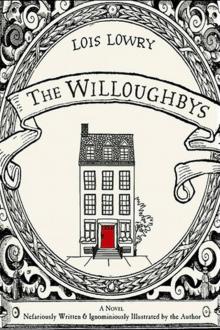 The Willoughbys
The Willoughbys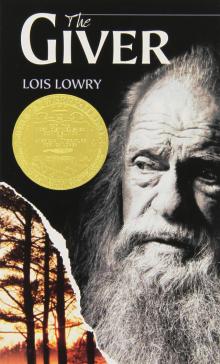 The Giver
The Giver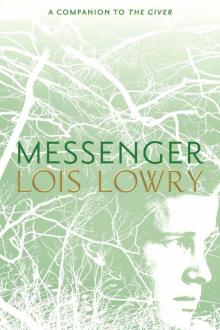 Messenger
Messenger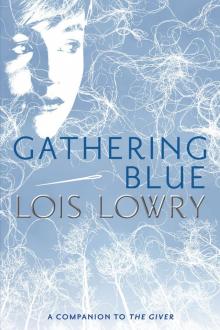 Gathering Blue
Gathering Blue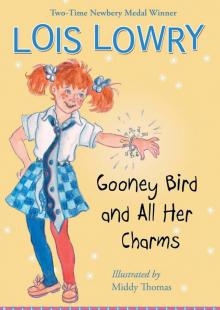 Gooney Bird and All Her Charms
Gooney Bird and All Her Charms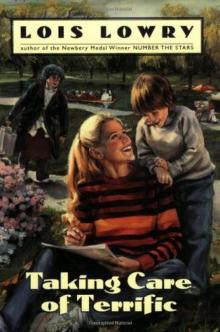 Taking Care of Terrific
Taking Care of Terrific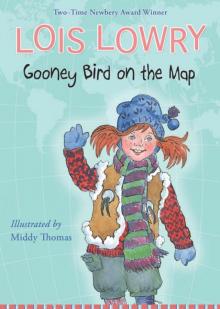 Gooney Bird on the Map
Gooney Bird on the Map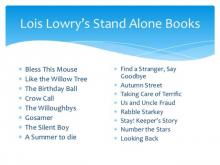 The Birthday Ball
The Birthday Ball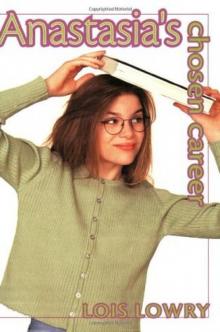 Anastasia's Chosen Career
Anastasia's Chosen Career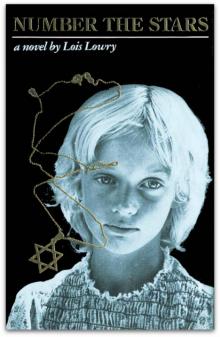 Number the Stars
Number the Stars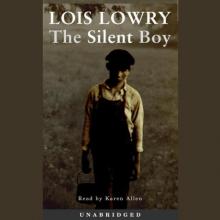 The Silent Boy
The Silent Boy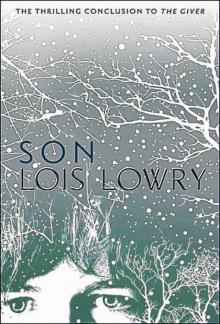 Son
Son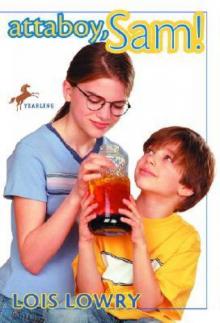 Attaboy, Sam!
Attaboy, Sam!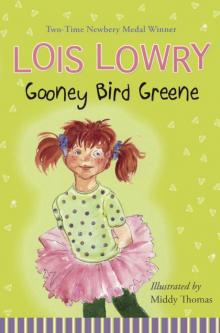 Gooney Bird Greene
Gooney Bird Greene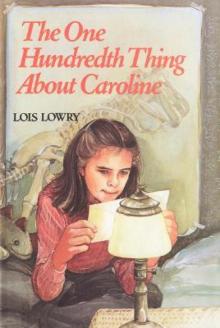 The One Hundredth Thing About Caroline
The One Hundredth Thing About Caroline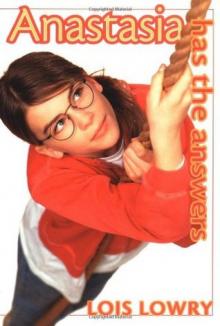 Anastasia Has the Answers
Anastasia Has the Answers Your Move, J. P.!
Your Move, J. P.!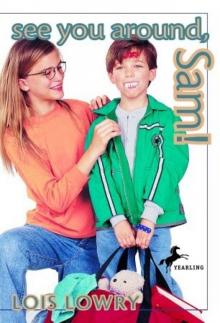 See You Around, Sam!
See You Around, Sam!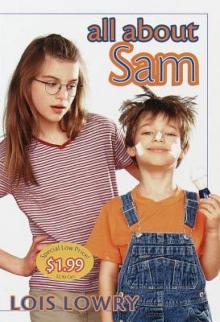 All About Sam
All About Sam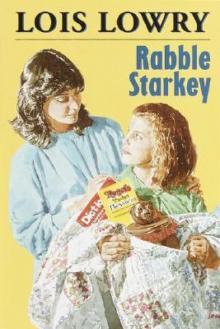 Rabble Starkey
Rabble Starkey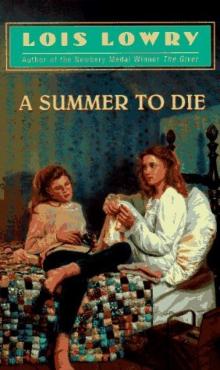 A Summer to Die
A Summer to Die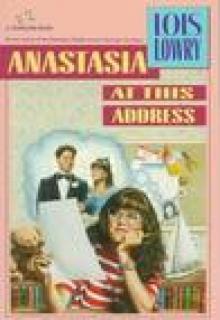 Anastasia at This Address
Anastasia at This Address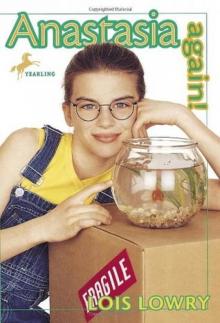 Anastasia Again!
Anastasia Again!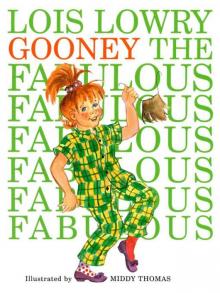 Gooney the Fabulous
Gooney the Fabulous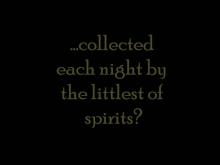 Gossamer
Gossamer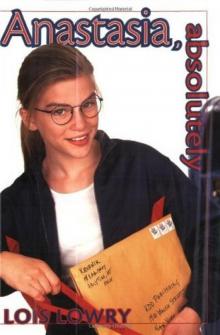 Anastasia, Absolutely
Anastasia, Absolutely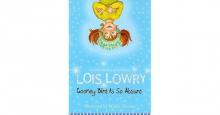 Gooney Bird Is So Absurd
Gooney Bird Is So Absurd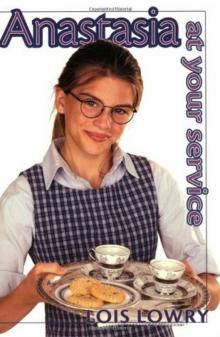 Anastasia at Your Service
Anastasia at Your Service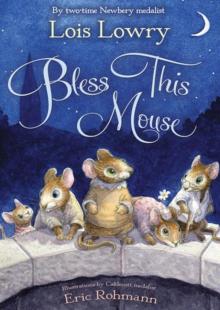 Bless this Mouse
Bless this Mouse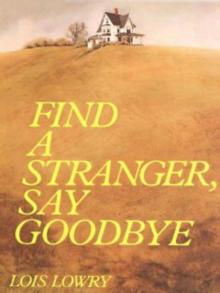 Find a Stranger, Say Goodbye
Find a Stranger, Say Goodbye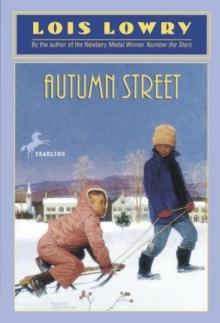 Autumn Street
Autumn Street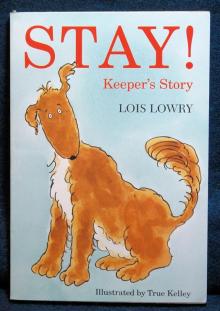 Stay Keepers Story
Stay Keepers Story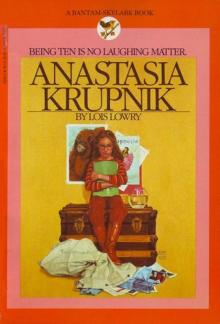 Anastasia Krupnik
Anastasia Krupnik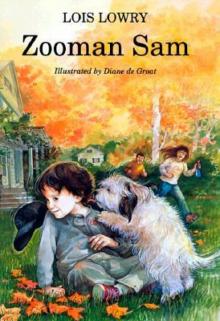 Zooman Sam
Zooman Sam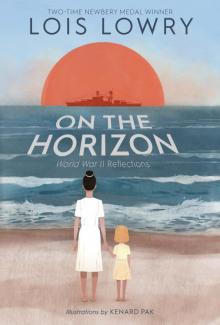 On the Horizon
On the Horizon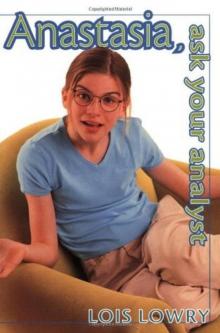 Anastasia, Ask Your Analyst
Anastasia, Ask Your Analyst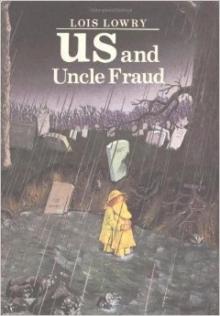 Us and Uncle Fraud
Us and Uncle Fraud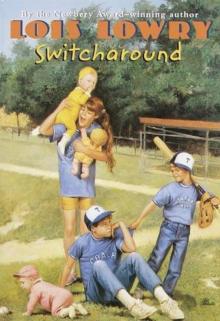 Switcharound
Switcharound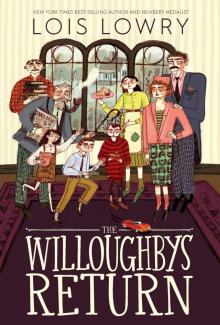 The Willoughbys Return
The Willoughbys Return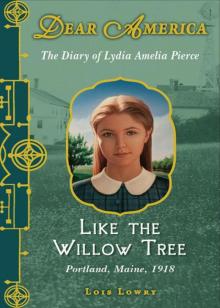 Dear America: Like the Willow Tree
Dear America: Like the Willow Tree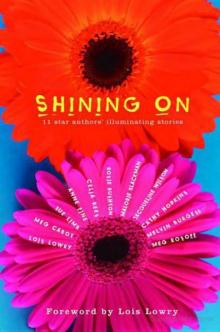 Shining On
Shining On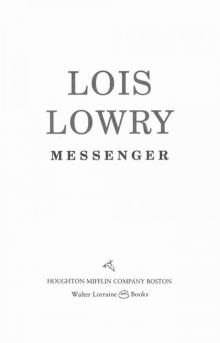 Messenger (The Giver Trilogy)
Messenger (The Giver Trilogy)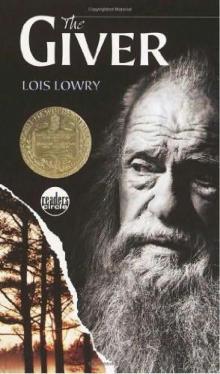 Giver Trilogy 01 - The Giver
Giver Trilogy 01 - The Giver